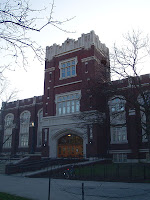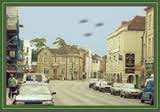Yesterday, a close friend drove his only child down to Williamsburg, for her freshman year, at William and Mary, as my only child gets ready for another year of grad school, at home, in DC. When I was going off to college for my freshman year, my roommate, with whom I had exchanged a few letters, and I concerned ourselves with curtains, matching bedspreads, dorm room decor, and fashion trends, dictated by the August issue of Seventeen Magazine. Nowadays, I am told, by members of the class of 2015, that dorm decor is passe. Divvying up who brings mini-frig, espresso machine, flat-screen TV, microwave, Brita pitcher are what is pressing.
John wrote a sweet chapter about going off to college, for his freshman year, at Ball State U, in 1964, in the second volume of his memoirs, Come on Fluffy, This Ain’t No Ballet! I share, with you, John’s recollections, below. Don’t you wish you could be a college freshman again…for a day?! Tempus fugit!
Annie


 Chapter 29 Frosh
Chapter 29 Frosh
Mom, Dad, David, and Connie would all be with me on the trip taking me to Muncie. The trunk was loaded, and we were off. Connie, then eleven years old, regretted having to leave her already impressive collection of Beatle memorabilia, the posters and magazine pictures of which completely covered the knotty pine paneling of her bedroom and even part of the ceiling. Figurines and Beatle record albums dotted her collection too, and there was not one of the records she didn’t own and display on her dresser or window sills. Her favorite Beatle was Paul whose very name made her swoon, even as David and I came close to gagging, though we did like Paul’s music.
Arriving in Muncie a day before my dorm opened, we were met by John Starnes, a tall, lanky graduate student, who was the “floor manager” of Essex House in Whitcraft Hall, where I would be a student resident in room 217. As the room was not quite ready, and the dining hall would not be open until the next afternoon, John suggested I show my family the campus while he saw to my bed linens and got me a key.
After giving my family an abbreviated tour and letting David and Connie rub Frog Baby’s nose in the art gallery, Connie suggested we all go to the Rivoli Movie Theater downtown, where she had noticed on the marquis the Beatle movie title, A HARD DAY’S NIGHT. After almost convincing my parents that the film would be an historic viewing experience and that if she didn’t see it, she would probably die from grief, Mom and Dad agreed that we should go. None of us had any feeling of disappointment, even my parents, who were still loyal fans of Benny Goodman, the Dorsey Brothers, and Glenn Miller. The comic insanity of the movie, which would be copied by countless other rock groups and even inspire a television show called, “The Monkees,” won us over, giving my sister an obvious sense of pride and accomplishment at her having recommended it. My brother’s comment that the movie was, “cool” only reinforced my sister’s adoration of The Fab Four.
Dad decided to drive back to Hammond the same day after dropping me off at the dorm, which was a brand new building and in which I was to be the very first freshman resident, as only the grad students would be arriving until the next day. Of course, this gave me the chance to choose the bed nearer the window. The two desks were on either side of the window, but I chose the one with the telephone, which was inside a kind of revolving tube in the wall so that it could be shared by two rooms, that is to say by four students. The largest rooms on our floor were the ones at either end of the hall, each housing three students, but I was glad not to have the confusion, extra noise, and possible eccentricity of a third roommate. All I knew at that time was that my roommate’s name was Stephen D. Etter, and he was from Kokomo, Indiana, majoring in art.
John Starnes worried that I was all alone in a foreign territory, and he took me under his wing to introduce me to the rest of the graduate staff and even invited me to join them for dinner at a restaurant called “The Patio.” The twelve staff members were all very friendly, engaging me in their conversations and showing genuine interest in my being at Ball State. My only suspicion was that a couple of them actually seemed overly anxious to establish a friendly bond as though they might be winning my loyalty in preparation for making me some kind of narc to help them out when the hundreds of other freshmen arrived the next day. Looking back, I can see that my feeling of being put on my guard was only a tiny bit paranoid. It turned out that later on a few freshmen were indeed recruited as stool pigeons who would report questionable activity to the staff.
I slept well that first night, as the dorm was absolutely quiet, something I would never again be able to say. Ever after there would be, despite rules for quiet after ten in the evening, a barrage of music from record players and radios from almost every room, which would become a familiar college cacophony, especially during warmer weather, since there was no air conditioning, and windows remained open much of the fall and spring terms. One would have thought that my dorm was the music building.
The next morning the dining hall had not yet opened, so I walked downtown to a little restaurant called Aunt Shirley’s Chicken Shack for breakfast and returned to the dorm to find that many cars were already dropping off students, who in spite of their expensive-looking Madras shirts and Italian sandals, had the appearance of clueless freshmen, just like me. Opening the door to room 217, I found two guys sitting in the arm chairs, open luggage and unpacked clothing strewn about on the bed away from the window and over the desk.
“You must be John,” said the one with dark hair.
“Call me Bud,” I replied in a sudden and unexplainable need to sound less aloof and more like one of the guys. “You must be Steve,” I continued.
“Call me Denny. My full name is Stephen Densmore Etter, but if you tell anybody my middle name, I’ll have to kill you,” he laughed. “This is my friend, Richard Thatcher. We grew up together, and he’ll be in Elliot Hall on the other side of the campus.”
“Call me Dick,” said Denny’s companion, who was blond, statuesque and blue-eyed, like the movie star, Troy Donahue, giving me the immediate if unfair impression that he would be yet another fierce competitor in the quest to find dates on campus.
Denny said that it made no difference to him which bed and desk he had, as he had already resolved neither to sleep nor to study all that much. That statement at the time seemed to give me a clear if terrifying look at my college roommate, but I decided to give him a chance to prove his worth before having go push him out our second-story window. As it turned out, Denny was quiet and very considerate, even if eccentric. For example, as an art major, he had an easel set up in our room near the window in order to do oils on canvas. What made this activity unusual was Denny’s superstitious insistence upon wearing his girl friend Christine’s silk panties as a sort of beret during his artistic creations and playing a recording of the Philadelphia Symphony Orchestra’s performance of “The Sorcerer’s Apprentice.” Denny said that his paint brushes were his brooms and magic wands.
In those days the campus dorm dining hall required on Sundays that girls wear dresses and that boys wear coats and neckties. Buzz Williams, one of our dorm mates complied with that rule but didn’t think that wearing flip-flops would be questioned until the Sunday he was sent back upstairs to put on shoes and socks. Then there was a guy named “Duck” from a room two doors down from ours, who would pocket in a canvas bag any extra bread or rolls to satisfy his regular midnight cravings for snacks. Though the girls’ dorms were separate, we dined together, and they were in Palmer House requiring an elevator ride to a check-in desk manned by a stout woman with tortoise shell glasses, while Bradley Hall next to us was separated only by a fire door, which was carefully bolted.
The third week into September while climbing along the stone outer window ledge toward a particular second floor window of the girl’s dorm, Bradley House, Denny slipped and fell to the garden below, barely missing a granite bench but spraining his left ankle and limping sheepishly back upstairs with amber and gold mums in every available orifice. Meanwhile, the girl whose room he had been invited to visit in this unconventional and dangerous way was screaming as she leaned out her window with the screen removed, her hands on both her cheeks. “Are you all right? Speak to me, Denny!” Later that afternoon Duck and I paid a visit to the campus infirmary, where Denny was being checked and having his ankle bandaged. I took him some mums, and Duck gift wrapped him a kaiser roll left from the previous Sunday dinner.
College classes in lecture halls were new experiences for me, especially in terms of the impersonal space shared by so many at once and the arduous note taking for the long and sometimes lavish lectures by professors who were relaxed enough at times even to smoke cigarettes or pipes. Some profs were riveting, like Professor Haave for English, who wore a high collar always with a silk scarf and spoke rapturously about Thomas Wolfe. Others, like the one for American History could have been very successful anesthesiologists without even using gas or chemicals. Then there were the specialty classes like advanced French with twenty or fewer students and were much more intimate as well as more demanding in terms of individual response expected by the prof. Dr. Robert Cohen was my first French professor, an elegantly tall, tanned fellow of lean physique, whose silver hair and melodious voice helped to make him a much more popular teacher than Dr. Javor, whose two large, protruding, silver front teeth were said to have blinded students temporarily when he lectured near the classroom windows on sunny days.
My first physical education class in college was tennis that quarter, which was conducted on outdoor courts well into the snows of November, even though the rather sadistic instructor insisted we play wearing shorts and polo shirts. His theory was that the cold air would keep us alert and moving, and he was right. The cold air often kept me moving right along to the campus coffee shop instead of to tennis class. Those absences affected my skills tests, which brought a final grade of “D” for the course. The grade lept from the page of otherwise high marks for other classes, but it was the “D” about which Dad had the most to say, insisting that there was no excuse for a low grade in a class I wasn’t even attending all the time. The instructor, Mr. Kornas, agreed.
In mid October, something happened that brought back the only unpleasant memory of my high school senior trip to New York City. It was a Friday evening after nine, two hours from curfew when the dorm’s outer doors would be locked for the night. There had recently developed a despicably immature habit on the upper floors of the boys’ dorm of waiting for guys to sit with their dates on the granite benches in the garden below until they kissed the girls. At that moment, Buzz, Duck, and Rick Smeltzer would throw a small bucket of water through a window screen to drench the poor, unsuspecting couple below. It was admittedly an activity wanting in civilized behavior and certainly revealing of the need on the part of a few socially challenged freshmen to “get out more.” That evening I had left our door open to go downstairs to the snack machine for some pretzels to go with the popcorn I was making. Denny was downtown with his girlfriend Chris who was visiting from Kokomo and staying with one of her friends in another dorm for the weekend.
I began to make the popcorn in the electric popper on my desk, and just as I was closing the door to our room, I heard a door at the end of the hall fly open hard enough to hit the wall with a crash. I looked out to see an enormous guy wearing a letter man jacket heading my way and cursing about his girlfriend being soaked by water thrown from somebody’s window. “I’ll kill the stupid son of a bitch who did this!” he yelled. “Beth could get pneumonia from this dumb ass prank!”
I instantly turned out the light and jumped into Denny’s bed, still wearing my clothes and shoes and pulling the blanket over myself to feign sleep. On the record player was 101 Strings playing the Beatle song, “From Me to You.” As the lid from the popcorn popper began to fall off the rising excess of popping corn, the lid hit the floor just as the door, which I had not locked opened violently and the lights went on to reveal a mean looking giant whose heavy breathing signaled an anger way out of control, that made my heart begin to beat like a playing card stuck in the spokes of a moving bicycle tire. I rubbed my eyes as though I had been asleep for hours, sitting up but still clutching the blanket over my shoulders. Without saying a word, the guy headed straight for the window, running his hand across the wet screen, which told me right away that Buzz, Duck and Rick had been at it again, this time using the window of our room while I had been downstairs for those few moments. Then the guy’s massive hand reached for a corner of my blanket, pulling it off like a criminal’s final defense against the death penalty. His monster voice said only, “I should really mash you to a pulp, but I believe in reincarnation, so I don’t step on insects! But if this ever happens again, you’re a dead man.” With that he strolled across the room, took a handful of the now burning popcorn, walked out, slamming the door so hard behind him that the record player arm skipped to another song, “Bad Boy,” and my framed picture of Bob Dylan fell off the wall. In the hallway outside my door were Duck, Buzz, and Rick, rolling on the floor, like rabid hyenas.



